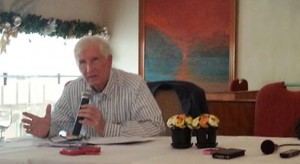Investors hit gov’t tax refund policy
The European Chamber of Commerce of the Philippines (ECCP) has slammed the government for making it more difficult anew for tax-paying investors to exercise their right to refund as this did not only breach the trust of the companies operating in the country but also hampered the entry of crucial foreign direct investments.
“If the state expects its taxpayers to observe fairness and honesty in paying their taxes, it must hold itself against the same standard. The Department of Finance (DOF) and the Bureau of Internal Revenue (BIR) do not do that,” said ECCP vice president for external affairs Henry J. Schumacher.
“Investors see the lack of transparency, predictability and consistency in the government’s behavior. Consequently, it is high time for the government to see the big picture rather than relishing in the short-term success of depriving investors of the VAT (value-added tax) refunds,” Schumacher added.
As it is, foreign investors are finding it difficult to secure their refunds on the excess input VAT credits and of the advanced VAT payments made by investors for the importation of capital equipment for infrastructure projects.
To make things worse, the BIR issued Revenue Memorandum Circular (RMC) No. 54-2014, in effect making it more difficult for tax payers to exercise their right to refund with due process and procedure. Due to the retroactive implementation of the revenue regulation, the ECCP official said that it prejudiced the rights of taxpayers with pending VAT claims.
Article continues after this advertisementThe ECCP issued the statement Friday to support the Embassy of Japan and the Japanese Chamber of Commerce and Industry of the Philippines in their drive to achieve an environment wherein the government—particularly the DOF, the BIR, the Court of Tax Appeals (CTA) and the Supreme Court (SC)—would make a concerted effort to deliver the valid refunds to trusting local and foreign businesses.
Article continues after this advertisement“It is more than unfortunate that the above organizations are making it more and more difficult to get VAT refunds by complicating the process of granting promised and entitled VAT refunds, in an obvious effort not to deliver what the government promised. The trust in the government is at stake,” Schumacher stressed.
The ECCP cited anew the case of San Roque Power Corp. (SRPC), which it said was an “unfortunate example of mistreatment.”
According to the foreign chamber, the government requested the Japanese power firm to invest in a power plant and offered duty- and tax-free importation of capital equipment as an incentive.
“SRPC invested and the plant is running for more than 10 years. Did they get the advanced VAT of P482 million back? No. While SRPC won at the CTA, the BIR pushed the case up to the Supreme Court—as usual. The good news was the SC First Division upheld the CTA (decision), but the bad news was the SC en banc, on reconsideration, reversed the First Division,” Schumacher said.
“As a result, investors are confused and disappointed. How do they explain to their management at home country and their shareholders that after more than 10 years after the import and the investment that your justified refund was denied?” Schumacher asked. “It is therefore not surprising that the Philippines is not getting the amount of foreign direct investment it needs to build much needed infrastructure, create manufacturing plants and develop agriculture for inclusive growth.”
